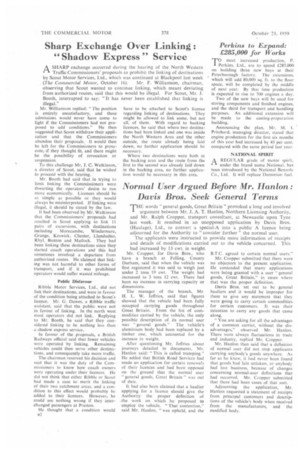Sharp Exchange Over Linking : "Shadow Express" Service
Page 36

If you've noticed an error in this article please click here to report it so we can fix it.
ASHARP exchange occurred during the hearing of the North Western Traffic Commissioners' proposals to prohibit the linking of destinations by Scout Motor Services, Ltd., which was continued at Blackpool last week (The Commercial Motor, October 16). Mr. F. Williamson, chairman,
observing that Scout wanted to continue linking, which meant deviating from authorized routes, said that this would be illegal. For Scout, Mr. J. Booth, interrupted to say: "It has never been established that linking is illegal."
Mr. Williamson replied: "The position is entirely unsatisfactory, and these admissions would never have come to light if the Commissioners had not proposed to add conditions." He then suggested that Scout withdraw their application and that the Commissioners abandon their proposals. it would then he left for the Commissioners to prosecute,-if they thought fit, and there might be the possibility of revocation or suspension.
To this challenge Mr. J. C. Watkinson, a director of Scout, said that he wished to proceed with the hearing.
Mr. Booth had said that in trying to limit linking the Commissioners were thwarting the operators' desire to run more economically. Licences should be as simple as possible or they would always be misinterpreted. If linking were illegal, it should be stated by the law.
It had been observed by Mr. Waticinson that the Commissioners' proposals had resulted in Scout applying to link 11 pairs of excursions, with destinations including Morecambe, Windermere, Grange, Keswick, Chester, Llandudno, Rhyl. Buxton and Matlock. They had been linking these destinations since they started coach operations and this had sometimes involved a departure from authorized routes. He claimed that linking was not harmful to other forms of transport, and if it was prohibited operators would suffer wasted mileage.
Public Disfavour
Ribble Motor Services, Ltd., did not link their destinations, and were in favour of the condition being attached to Scout's licence. Mr. G. Dawes, a Ribble traffic assistant, said that the public were not in favour of linking. In the north west most operators did not link. Replying to Mr. Booth, he said that they considered linking to be nothing less than a shadow express service.
In favour of the . proposals, a British Railways official said that fewer vehicles were operated by linking. Remaining vehicles could then serve other destinations, and consequently take more traffic.
The chairman reserved his decision and said that it was the duty of the Commissioners to know how coach owners were operating under their licences. He did not think that either Ribble or Scout had made a case to merit the linking of their two catchment areas, and a condition to this effect would probably be added to their licences. However,he could see nothing wrong if they interchanged passengers at Preston.
He thought that a condition would B2 have to be attached to Scout's licence regarding linking of destinations. They might be allowed to link some, but not all, of them. With regard to backing licences, he said that where two destinations had been linked and one was inside the North Western Area and the other outside, the route already being laid down, no further application should be necessary.
Where two destinations were both in the backing area and the route from the first to the second was already laid down in the backing area, no further application would be necessary in this area.




































































































